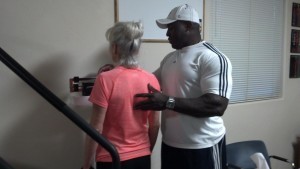How Much Do You Really Weigh?
How Much Do You Really Weigh?
 As my personal training clients work towards their fitness goals we often gauge their progress by the amount of weight they have lost. Using the scale as a way to measure their progress is a good way to set fitness goals to work towards but there are some factors to take into consideration.
As my personal training clients work towards their fitness goals we often gauge their progress by the amount of weight they have lost. Using the scale as a way to measure their progress is a good way to set fitness goals to work towards but there are some factors to take into consideration.
- Weigh yourself at the same time of day, preferably first thing in the morning. Morning is usually the best time to weigh due to the fact that a person’s weight will fluctuate depending on the types and amounts of food and liquid consumed during the day. It is not unusual to weigh more in the evening than you did in the morning especially if you’ve consumed foods that are high in sodium.
- Weigh once a week. For most people, checking your weight once a week is adequate. Daily weight fluctuations are common and for some people weighing everyday can lead to obsessive and unhealthy behavior.
- Use a good quality scale. Using the scale at the gym or doctor’s office is going to give you a more accurate reading because these scales are higher quality scales. A less expensive scale may actually read lower than the scale at the gym giving you an inaccurate reading which can lead to disappointment.
- Try to use the same scale each time you weigh. If you use the same scale each time you weigh you’ll have a better idea of what your weight is doing even if the scale is not accurately calibrated.
- Try to wear the same type of clothing when you weigh. Certain clothes and shoes will weigh more than others. For example, you would obviously weigh more if you’re wearing hiking boots versus no shoes at all.
- For women, weight will increase during certain times of the month. Usually a woman will weigh more when she is menstruating due to an increase in water retention. This needs to be taken into consideration when monitoring your weight with a scale.
For more health, fitness, and diet tips, or if you’ve been thinking about hiring a personal trainer, contact us.

